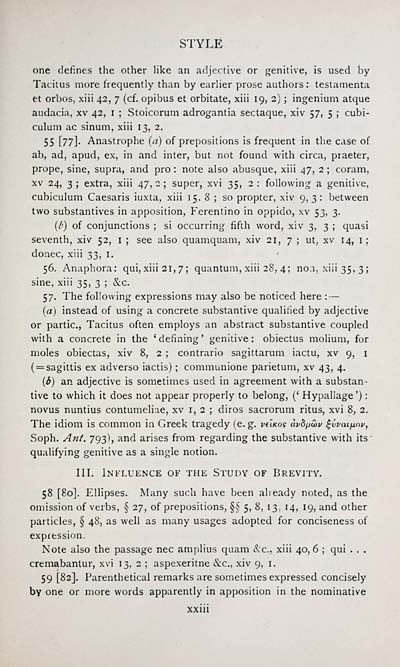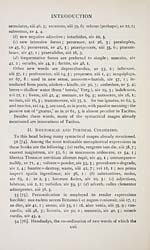Download files
Complete book:
Individual page:
Thumbnail gallery: Grid view | List view

STYLE
one defines the other like an adjective or genitive, is used by
Tacitus more frequently than by earlier prose authors : testamenta
et orbos, xiii 42, 7 (cf. opibus et orbitate, xiii 19, 2) ; ingenium atque
audacia, xv 42, i ; Stoicorum adrogantia sectaque, xiv 57, 5 ; cubi-
culum ac sinum, xiii 13, 2,
55 [77]- Anastrophe (a) of prepositions is frequent in the case of
ab, ad, apud, ex, in and inter, but not found with circa, praeter,
prope, sine, supra, and pro : note also abusque, xiii 47, 2 ; coram,
XV 24, 3; extra, xiii 47,2; super, xvi 35, 2: following a genitive,
cubiculum Caesaris iuxta, xiii 15, 8 ; so propter, xiv 9, 3 : between
two substantives in apposition, Ferentino in oppido, xv 53, 3.
(/>) of conjunctions ; si occurring fifth word, xiv 3, 3 ; quasi
seventh, xiv 52, i ; see also quamquam, xiv 21, 7 ; ut, xv 14, i ;
donee, xiii 33, i.
56. Anaphora: qui,xiii 21, 7 ; quantum, xiii 28, 4; no.i, xiii 35, 3 ;
sine, xiii 35, 3 ; &c.
57. The following expressions may also be noticed here : —
(a) instead of using a concrete substantive qualirted by adjective
or partic, Tacitus often employs an abstract substantive coupled
with a concrete in the 'defining' genitive: obiectus moliuni, for
moles obiectas, xiv 8, 2 ; contrario sagittarum iactu, xv 9, i
( = sagittis ex adverso iactis) ; communione parietum, xv 43, 4.
(6) an adjective is sometimes used in agreement with a substan-
tive to which it does not appear properly to belong, (' Hypaliage ') :
novus nuntius contumeliae, xv i, 2 ; diros sacrorum ritus, xvi 8, 2.
The idiom is common in Greek tragedy (e.g. velKos dvdpav ^vvcufAnv,
Soph. Afi/. 793), and arises from regarding the substantive with its
qualifying genitive as a single notion.
III. Influence of the Study of Brevity.
58 [80]. Ellipses. Many such have been already noted, as the
omission of verbs, § 27, of prepositions, §§ 5, 8, 13, 14, 19, and other
particles, § 48, as well as many usages adopted for conciseness of
expiession.
Note also the passage nee amplius quam &c., xiii 40,6 ; qui . . .
cremabantur, xvi 13, 2 ; aspexeritne &c., xiv 9, i.
59 [82]. Parenthetical remarks are sometimes expressed concisely
by one or more words apparently in apposition in the nominative
xxiii
one defines the other like an adjective or genitive, is used by
Tacitus more frequently than by earlier prose authors : testamenta
et orbos, xiii 42, 7 (cf. opibus et orbitate, xiii 19, 2) ; ingenium atque
audacia, xv 42, i ; Stoicorum adrogantia sectaque, xiv 57, 5 ; cubi-
culum ac sinum, xiii 13, 2,
55 [77]- Anastrophe (a) of prepositions is frequent in the case of
ab, ad, apud, ex, in and inter, but not found with circa, praeter,
prope, sine, supra, and pro : note also abusque, xiii 47, 2 ; coram,
XV 24, 3; extra, xiii 47,2; super, xvi 35, 2: following a genitive,
cubiculum Caesaris iuxta, xiii 15, 8 ; so propter, xiv 9, 3 : between
two substantives in apposition, Ferentino in oppido, xv 53, 3.
(/>) of conjunctions ; si occurring fifth word, xiv 3, 3 ; quasi
seventh, xiv 52, i ; see also quamquam, xiv 21, 7 ; ut, xv 14, i ;
donee, xiii 33, i.
56. Anaphora: qui,xiii 21, 7 ; quantum, xiii 28, 4; no.i, xiii 35, 3 ;
sine, xiii 35, 3 ; &c.
57. The following expressions may also be noticed here : —
(a) instead of using a concrete substantive qualirted by adjective
or partic, Tacitus often employs an abstract substantive coupled
with a concrete in the 'defining' genitive: obiectus moliuni, for
moles obiectas, xiv 8, 2 ; contrario sagittarum iactu, xv 9, i
( = sagittis ex adverso iactis) ; communione parietum, xv 43, 4.
(6) an adjective is sometimes used in agreement with a substan-
tive to which it does not appear properly to belong, (' Hypaliage ') :
novus nuntius contumeliae, xv i, 2 ; diros sacrorum ritus, xvi 8, 2.
The idiom is common in Greek tragedy (e.g. velKos dvdpav ^vvcufAnv,
Soph. Afi/. 793), and arises from regarding the substantive with its
qualifying genitive as a single notion.
III. Influence of the Study of Brevity.
58 [80]. Ellipses. Many such have been already noted, as the
omission of verbs, § 27, of prepositions, §§ 5, 8, 13, 14, 19, and other
particles, § 48, as well as many usages adopted for conciseness of
expiession.
Note also the passage nee amplius quam &c., xiii 40,6 ; qui . . .
cremabantur, xvi 13, 2 ; aspexeritne &c., xiv 9, i.
59 [82]. Parenthetical remarks are sometimes expressed concisely
by one or more words apparently in apposition in the nominative
xxiii
Set display mode to: Large image | Transcription
Images and transcriptions on this page, including medium image downloads, may be used under the Creative Commons Attribution 4.0 International Licence unless otherwise stated. ![]()
| Early Gaelic Book Collections > Matheson Collection > Cornelli Taciti annalium > (27) |
|---|
| Permanent URL | https://digital.nls.uk/76567252 |
|---|
| Description | Items from a collection of 170 volumes relating to Gaelic matters. Mainly philological works in the Celtic and some non-Celtic languages. Some books extensively annotated by Angus Matheson, the first Professor of Celtic at Glasgow University. |
|---|
| Description | Selected items from five 'Special and Named Printed Collections'. Includes books in Gaelic and other Celtic languages, works about the Gaels, their languages, literature, culture and history. |
|---|

